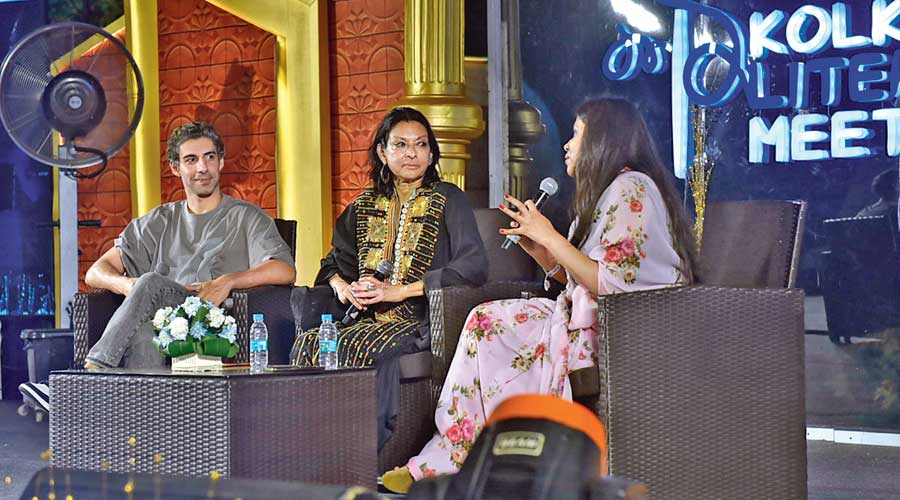Mallika Sarabhai, dancer, activist and daughter of scientist Vikram Sarabhai, said her father had serious differences with nuclear physicist Homi Bhabha but they never turned acrimonious, something that she felt was “unreal” in today’s context.
“We live in a world where a difference of opinion can mean a fatwa against you. And here were two people, deeply committed to science and to humanity with great differences of opinion but that never came in the way of their friendship. It’s unreal in today’s context, difficult to believe,” said Mallika.
Her comments came on Thursday, during a session on Day Three of Tata Steel Kolkata Literary Meet (Kalam), held in association with the Victoria Memorial Hall and The Telegraph.
The panellists, Mallika and actor Jim Sarbh, discussed Rocket Boys — a web series that shows the early days of India’s space and nuclear programmes through the lives of its founders, Homi J. Bhabha and Vikram Sarabhai, — with Shrayana Bhattacharya, economist with the World Bank and author.
Sarbh plays Bhabha and Mallika, apart from giving inputs to the makers, has trained in Bharatanatyam the actor who plays her mother.
Icons we need
Mallika’s association started with a phone call from a nephew, who was friends with one of the makers of the show.
A team came to meet the Sarabhai family. “The first thing they said was that they wanted to make this because they feel that the kind of fraud and corrupt people that are being made into heroes in our films and web series... We need to give young people icons who were selfless, brilliant and had a vision,” said Mallika.
She worked “very closely” with the team for two-and-a-half years.
“I knew Homi Bhabha very well as a child. He was a very dear friend of my mother, very much a part of my growing up. What I wanted to do was to never go away from the nature of the two human beings.
Bhattacharya said how Bhabha and Sarabhai had their conflicts and yelled at each other but were also able to “handle it with dignity”.
“They were great visionaries but not black and white,” said Mallika before contrasting their relationship with the present times.
“Nation building today has become jingoism and killing the other. Anybody I don’t agree with can be killed and is a jihadi. I am a jihadi all the time,” she said.
Reel and real
The makers of the show have been accused of historical inaccuracy and playing to Islamophobia.
The allegations revolve around the omission of Meghnad Saha — among the greatest scientists India has ever produced and a contemporary of Bhabha — from the show.
However, a fictional character, a Kolkata physicist who is jealous of Bhabha and is a critic of Jawaharlal Nehru, is allegedly modelled on Saha. His name in the show is Mehdi Raza.
“I wanted to get your thoughts on the way this Mehdi Raza character was brought into the show. There has been a lot of critique on the fact that professor Saha is not present in the show,” asked Bhattacharya.
Sarbh, speaking on behalf of the director, said: “Mehdi is not supposed to be Saha. He is an amalgamation of characters. There wasn’t enough time in the script. Consider that just on any one of them (Homi Bhabha or Vikram Sarabhai) you could have two seasons of a show.
“Now, when you bring in two people, you have to nitpick the moments and choose which ones finally make it to your show to represent not just their scientific achievements but a representation of them as human beings and real visionaries, not painted ones.”
He went on: “They don’t breeze through situations without difficulties, they have personal conflicts. In order to paint these people as they were, these people (makers) have chosen moments that they have chosen. What’s the point of having Doctor Saha on the show and have him be underrepresented?”
Sarbh pointed out how no one had made such a “hullabaloo” over the omission of Bhabha’s own brother, Jamshed, from the show.
On allegations of Islamophobia, Sarbh wondered if the critics had seen the complete series. “Have you seen the last episode though? He (Mehdi Raza) is not the bad guy.... It’s playing upon this very misconception that you have and then subverting it. It is the director’s choice to subvert ideas of rampant Islamophobia that I think is rampant through the nation as of now,” he said.
